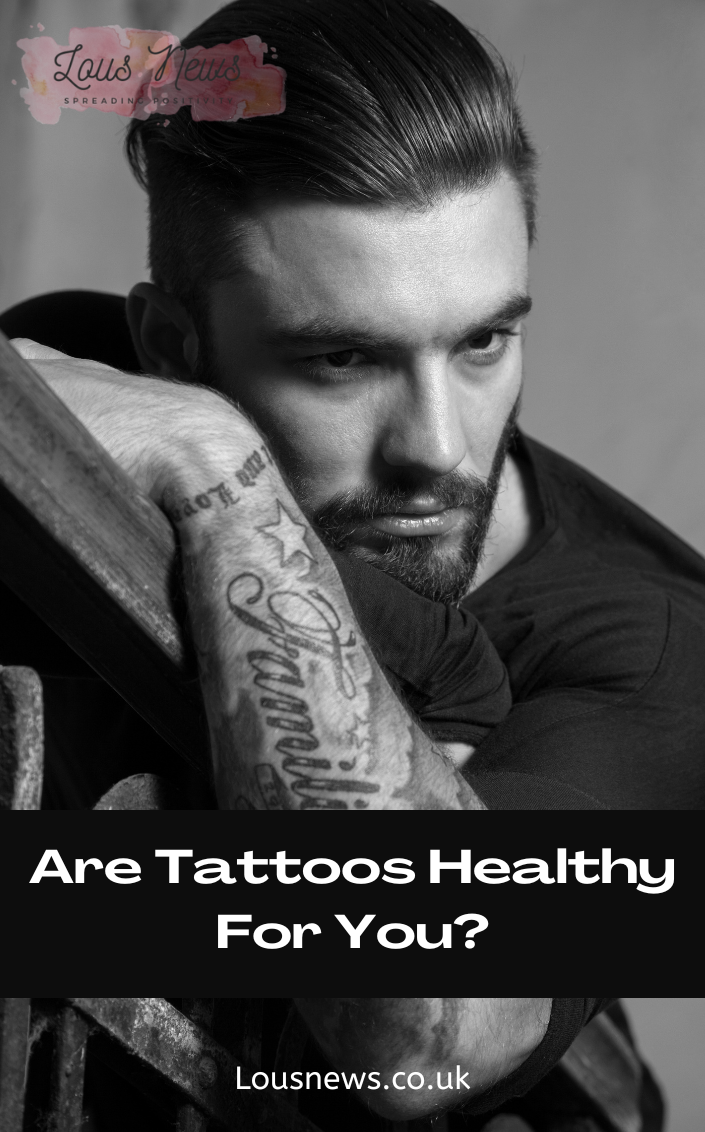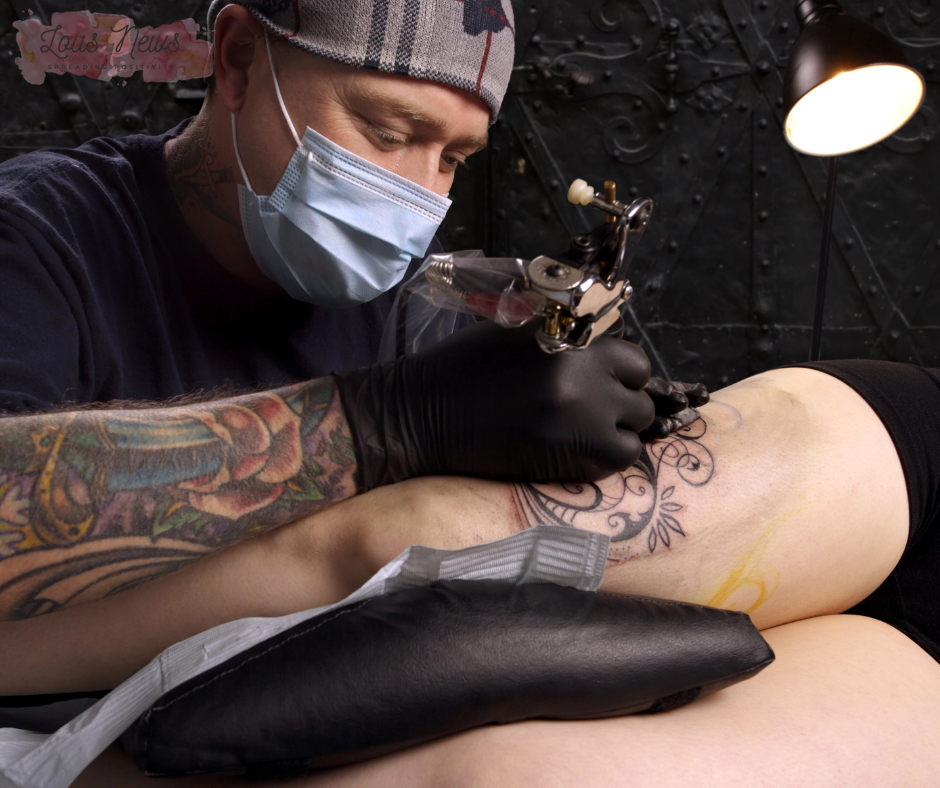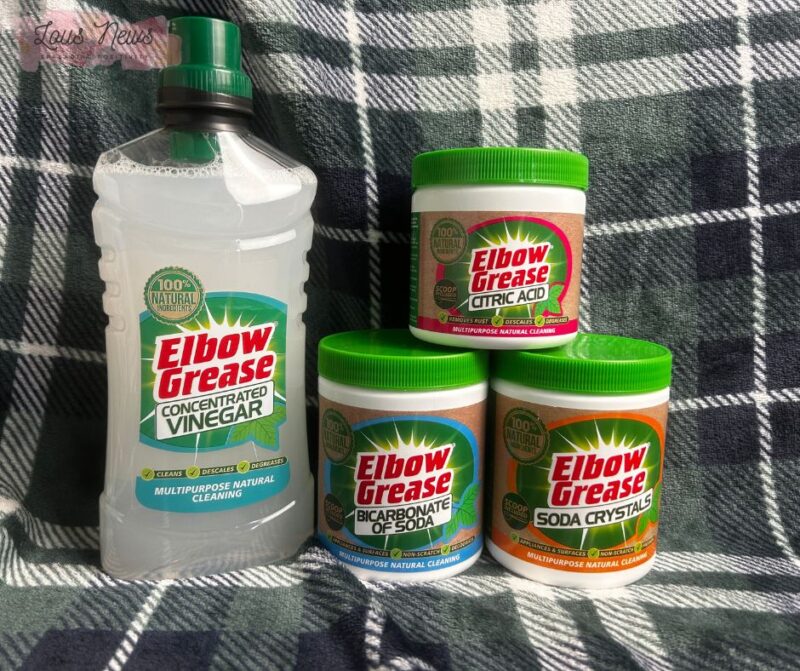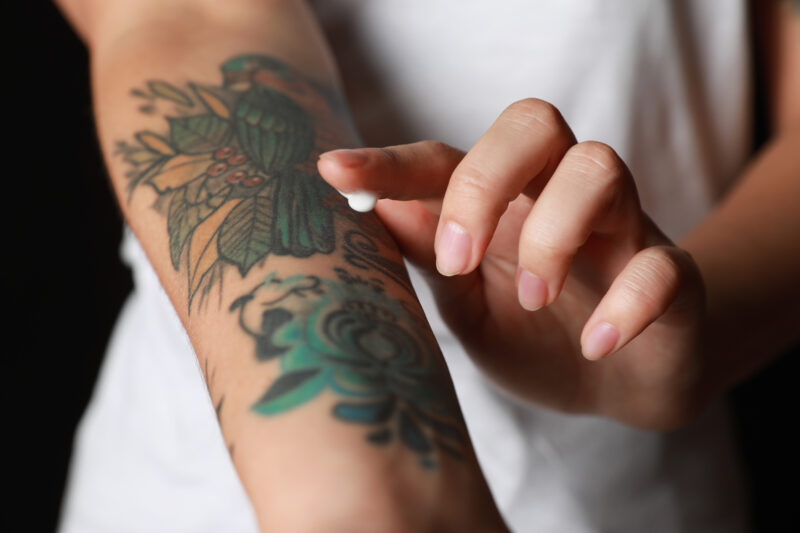Is Getting Tattoos Healthy For You?
When it comes to tattoos, if you didn’t already know I have quite a few. Most of you wouldn’t be able to see although I do have a wrist one which is obvious unless I’m wearing sleeves. I love my tattoos, they have a purpose and that’s even if it’s because they look cool.
I think a lot of people who don’t have tattoos will criticise them because they “don’t mean anything” whereas we should all be feeling liberated and cheer anyone on regardless of their choice or your views. That aside, I like to talk about tattoos so I thought this would be a good post.
If you haven’t already, take a look at my dealing with post tattoo blues article to make sure you’re ready for the day after!
Are Tattoos Healthy For You?
There are two ways to look at this, physically and mentally.
Are Tattoos Healthy Physically?
Tattoos involve puncturing the skin with needles to inject ink into the dermis layer, creating permanent designs or images. While tattoos themselves aren’t inherently unhealthy, the process of getting a tattoo and the aftercare required can pose some physical health risks:
- Pain and discomfort: Getting a tattoo can be painful, depending on the location and size of the design, as well as individual pain tolerance. Some people may experience discomfort during and after the tattooing process.
- Risk of infection: Tattooing involves breaking the skin barrier, which can increase the risk of bacterial or viral infections if proper hygiene and sterilisation procedures are not followed. Infections can lead to redness, swelling, pain, and potentially more serious complications if left untreated.
- Allergic reactions: Some individuals may experience allergic reactions to tattoo ink, which can contain various pigments and additives. Allergic reactions may cause itching, swelling, redness, or rash around the tattooed area.
- Skin irritation: Tattoos can cause skin irritation, especially during the healing process. Itching, dryness, and flakiness are common side effects as the skin heals.
- Scarring and keloids: Improper tattooing techniques or inadequate aftercare can lead to scarring or the formation of keloids, which are raised scars that extend beyond the original tattoo site.
- Bloodborne diseases: If tattoo equipment is not properly sterilised or if needles are reused, there is a risk of transmitting bloodborne diseases such as Hepatitis B, Hepatitis C, or HIV.
This is why it’s always important to fill out the sheet a tattooist will give you before the tattoo. You’re able to list any reactions if you have sensitive skin and more. This will also help them give you the best aftercare advice based on your needs.
Personally, I probably shouldn’t get tattoos as they get infected and dry out easily. I use Epimax on my tattoos at least once a week to stop them from getting dried out and most of the time I have to go to the doctor’s for antibiotics, if you think your tattoo is getting infected, don’t waste time going to the doctors or it may scare and the tattoo will become patchy. Infections are more common in colour tattoos rather than black tattoos.
If you’re worry about infections, take a look at my How To Stop Your Tattoos from Getting Infected article for advice. That being said I am not a medical professional and if you feel like you need more help, seek an appointment with your GP as soon as you can.
Are Tattoos Healthy Mentally?
This is a hard one to work out, there are many sides to the mental wellbeing of someone who has got a tattoo.
The impact of tattoos on mental health can vary widely depending on individual experiences and perspectives. For some people, tattoos can have positive effects on mental well-being, while for others, they may present challenges. Here are some potential ways tattoos can influence mental health:
- Self-expression and identity: For many individuals, tattoos serve as a form of self-expression, allowing them to showcase their personality, beliefs, and values through body art. Tattoos can contribute to a sense of identity and empowerment, providing a means of outwardly expressing inner thoughts and emotions.
- Emotional significance: Tattoos often carry personal significance and symbolism, representing important life events, relationships, or milestones. Getting a tattoo can be a cathartic experience, allowing individuals to commemorate significant moments or cope with difficult emotions.
- Body image and self-esteem: For some people, tattoos can positively impact body image and self-esteem by enhancing feelings of self-confidence and self-acceptance. Tattoos may empower individuals to embrace their bodies and celebrate their uniqueness.
- Social connection: Tattoos can foster social connections and a sense of belonging within communities of like-minded individuals. Shared interests in tattoos and body art can facilitate social interactions, build relationships, and create a sense of camaraderie.
- Coping mechanism: In certain cases, tattoos may serve as a coping mechanism for managing stress, trauma, or emotional pain. The process of getting a tattoo or the symbolism behind the design may provide comfort, distraction, or a sense of control during challenging times.
Although there are positives to getting a tattoo for your mental health there are some things that need to be considered, mainly the aftermath of the tattoo. There is still a stigma around getting tattoos and the way prople judge others, although this have improved but still exists.
Getting down after a tattoo is quite common, if you’ve not heard of this take a look at my Getting Over Post Tattoo Blues And Taking Care Of Your Mental Health article for more information. Although many people say that having a tattoo can be nice at the time, a lot of people suffer with mild blues the next day which is why I always book a self care day and crack open my mental health comfort box so that I can mentally recover.
There are various ways you can look at getting a tattoo but with everything, there’s always a risk. If you’ve had bad reactions to tattoos before it might be wise to pass on another but they are great ways to express yourself and if you love your tattoos they can give you a little smile when you take a look in the mirror.
Can I Use Numbing Cream For A Tattoo?
It is always important to check with your tattooist in advance if you can use numbing cream and what numbing cream you are using. Some creams do not work or they react with a tattoo so the tattooist will be able to help you with picking the best creams for numbing your tattoo.
Where Is Best To Get Your First Tattoo?
This is a hard one because everyone has a different pain threshold and might expierence having a tattoo different. I have had tattoos in four different parts of my body, leg, wrist, back and chest and can say the pain was different in all areas. Anyone that tells you tattoos don’t hurt, is a liar.
It is considered more painful to have a tattoo on a bone or a crease, such as between your leg joint. Some of the best places are on your upper arm or thigh.
Here are some considerations to keep in mind when deciding where to get your first tattoo:
- Pain tolerance: Some areas of the body are more sensitive than others, and pain perception varies from person to person. For your first tattoo, you may want to choose a less sensitive area with more flesh and muscle to minimise discomfort. Common areas with lower pain sensitivity include the upper arm, outer thigh, and calf.
- Visibility: Consider whether you want your tattoo to be easily visible or easily concealable. For a first tattoo, you might opt for a location that can be covered by clothing for professional or formal settings, such as the upper back, chest, or thigh. Alternatively, if you want to show off your tattoo, you might choose a more visible location like the forearm, wrist, or ankle.
- Size and design: The size and design of your tattoo can also influence the best location. Larger designs may require more space and may be better suited for areas with ample surface area, such as the back, chest, or thigh. Smaller tattoos can be more versatile and can be placed on areas like the wrist, ankle, or behind the ear.
- Healing process: Keep in mind that different parts of the body heal at different rates, and some areas may require more care and attention during the healing process. Areas that are prone to friction or movement, such as the hands, feet, or ribs, may take longer to heal and may be more susceptible to irritation.
- Future considerations: Think about how your tattoo placement may affect future tattoos or lifestyle choices. Avoid areas that may stretch or change significantly over time, such as the abdomen or breasts during pregnancy. Additionally, consider how your tattoo placement may impact future career opportunities or social perceptions.
Who Can Get Tattoos?
In general, anyone over the legal age of consent for tattoos in their jurisdiction can get tattoos. However, specific regulations and restrictions may vary depending on factors such as age, health status, and parental consent. Here are some common considerations:
- Age: Most countries and regions have a minimum legal age requirement for getting tattoos, typically ranging from 18 to 21 years old. Minors are generally prohibited from getting tattoos without parental consent or supervision, although age requirements may vary by location.
- Health status: Individuals with certain health conditions or medical concerns may be advised against getting tattoos. This includes individuals with compromised immune systems, skin conditions, bleeding disorders, or allergies to tattoo ink or other materials used in the tattooing process. It’s essential to consult with a healthcare provider before getting a tattoo if you have any underlying health issues.
- Pregnancy and breastfeeding: It is generally recommended to avoid getting tattoos during pregnancy and while breastfeeding due to potential risks to the developing fetus or infant. The process of getting a tattoo involves puncturing the skin with needles, which can increase the risk of infection and may introduce harmful substances into the bloodstream.
- Consent: In some jurisdictions, parental or guardian consent may be required for minors to get tattoos. This ensures that minors fully understand the risks and responsibilities associated with tattooing and have parental approval before undergoing the procedure. Parental consent forms may be required for individuals under the legal age of consent for tattoos.
- Legal restrictions: Certain cultural or religious beliefs, as well as local regulations, may impose additional restrictions or considerations for getting tattoos. For example, some cultures may have specific taboos or traditions regarding tattooing, while certain jurisdictions may have regulations regarding tattoo content, location, or size.
Will Tattoos Get Lighter?
Over time, tattoos may naturally fade or lighten to some extent due to various factors, including sun exposure, skin ageing, and the body’s natural healing processes. However, the degree to which tattoos fade can vary depending on factors such as tattoo placement, ink quality, and individual skin characteristics. Here are some common reasons why tattoos may lighten over time:
- Sun exposure: Prolonged exposure to sunlight can cause tattoo ink to fade more quickly. Ultraviolet (UV) rays from the sun can break down the pigment molecules in the skin, leading to gradual fading and discolouration of the tattoo. To prevent excessive fading, it’s essential to protect tattoos from sun exposure by using sunscreen with a high SPF and wearing protective clothing when outdoors.
- Skin ageing: As the skin ages, it undergoes natural changes in elasticity, texture, and pigmentation. These changes can affect the appearance of tattoos over time, causing them to fade or blur slightly. Additionally, the skin’s ability to regenerate and retain pigment may diminish with age, contributing to gradual lightening of tattoos.
- Skin turnover: The skin is continually undergoing a process of regeneration and turnover, with old skin cells being shed and replaced by new ones. This turnover process can cause tattoo ink to gradually migrate deeper into the skin layers over time, leading to a slight lightening of the tattoo’s appearance.
- Lifestyle factors: Certain lifestyle factors, such as smoking, alcohol consumption, and poor skincare habits, can also impact tattoo longevity and appearance. Smoking, for example, can constrict blood vessels and reduce oxygen flow to the skin, potentially affecting tattoo healing and pigment retention.
While tattoos may lighten or fade over time, there are steps you can take to help maintain their appearance and prolong their lifespan. These include:
- Protecting tattoos from sun exposure by wearing sunscreen and protective clothing.
- Avoiding prolonged soaking in water, such as swimming or bathing, which can cause ink to fade more quickly.
- Moisturising the skin regularly to keep it hydrated and healthy.
- Choosing high-quality tattoo ink and reputable tattoo artists to ensure optimal results and longevity.
If you notice significant changes in your tattoo’s appearance or have concerns about fading, it’s advisable to consult with a dermatologist or tattoo artist for personalised advice and recommendations.
If you go back to your tattooist for a touch up I would always advise seeing the same tattooist that did your original tattoo. Colour is more likely to fade over time instead of black tattoos which is something to keep in mind when having a tattoo.








